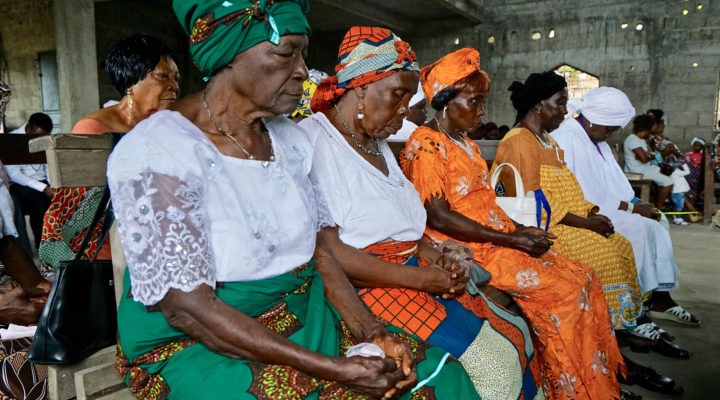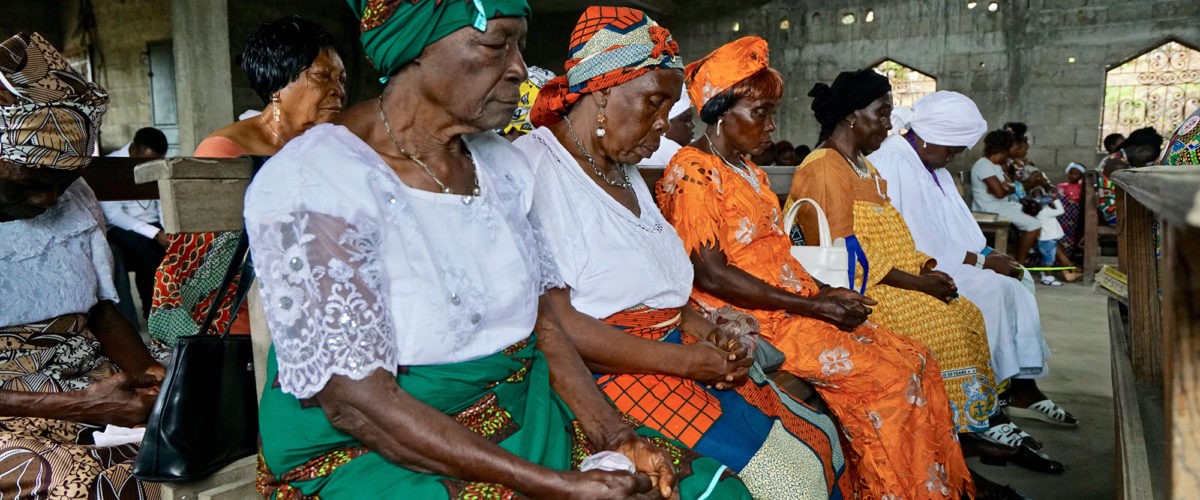Cameroon is at war because God did not approve the union between the French and English-speaking people. — Taku-Ayuk Moses
One of the world’s worst conflicts in recent years is the crisis in Cameroon, where separatist groups in the southern or English-speaking part of the country have been fighting to secede from the country also inhabited by French speakers. The conflict has created a humanitarian disaster, with many people killed and thousands of others displaced from their homes.
According to a Human Rights Watch report, “Hundreds of civilians have been killed since January 2020 in the North-West and South-West regions, where violence has been acute since the crisis began in late 2016, as separatists seek independence for the country’s minority Anglophone regions. Violence displaced tens of thousands of people in the past year, adding to the hundreds of thousands who have fled their homes since the start of the violence.”
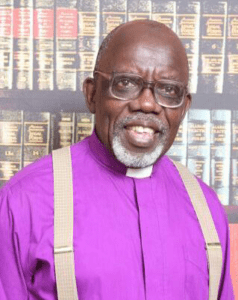
Taku-Ayuk Moses
Although many people around the world became aware of the separatist struggle in Cameroon about five years ago when law and order began to break down in the region with schools shutting down, Taku-Ayuk Moses, a Cameroonian pastor, says the quest for independence by the people of the southern region, where he hails from, had been going on for decades. The agitation, he said, was borne out of the maltreatment and injustice people of southern Cameroon had been subjected to.
Moses, who says he had been in the forefront of those clamoring for creation of the Ambazonia nation, as the separatist fighters call their dream nation, said however that his contribution is through prayer. In an interview with BNG on Sept. 2, Moses said the union between the French- and English-speaking people of Cameroon was not formalized after the latter seceded from Nigeria to join French-speaking Cameroon in 1961. Because of this, he believes the union was not approved by God.
“The Lord revealed to me that the war is justified in that the union had no legality on earth and so it’s not established in heaven. The Bible says that what is agreed here on earth is established in heaven,” Moses asserted, adding that the UK and United Nations are to be blamed for the problem.
Moses has lived in the U.S. since the mid 2000s. He arrived in the country from Nigeria, where he earlier had sought refuge after fleeing Cameroon for fear of his life. He said his effort to speak truth to power in his home country angered some people in government who sent assassins after him.
“The Lord revealed to me that the war is justified in that the union had no legality on earth and so it’s not established in heaven.”
Since arriving in the U.S., Moses says he spends his time praying not just for Africa but for the U.S.
“I live in Houston. I’ve been here since I came to the U.S., but I go to other states to preach and come back here,” he said, adding that he prays not only for ordinary people but for heads of governments too. “The Bible (Timothy 1:2) says to pray for those in authority. So one of my responsibilities is to pray for those in authority.”
An hour-long interview revealed this native clergyperson’s thoughts on the Ambazonia struggle and religion. The following answers have been edited for brevity.
You are a Cameroonian pastor based in the U.S. Do you mind to tell us about your ministry journey?
I’ve been in the ministry since 1990, when I met the Lord on a hospital bed in Italy. He healed me and commissioned me to go and heal others, so I became born again, Holy Spirit-filled in 1991. So, from 1991 to date, I’ve been a trained minister, I’ve been an ordained minister, I have been impacted by many generals in the body of Christ. I am from Southern Cameroon, which was part of Nigeria up to 1953 and then the people took charge and ruled themselves from 1954 to 1961 when they were forced to join back Nigeria or the Republic de Cameroon in order to obtain their independence. I come from the southwest, from Mamfe, which shares a boundary with Calabar, Cross River State, Nigeria. I lived in Victoria, in the south, near Douala. We have our seaport and refinery in Victoria, nationally known as Limbe but the original name was Victoria.
The area you mentioned has been in crisis for some years now owing to a secessionist struggle for what the agitators call Ambazonia nation. How would you say the crisis has affected Cameroon?
The history I can provide is that the union was forced unto southern Cameroonians by U.N. and UK. They (Southern Cameroonians) had lived and ruled themselves from 1954 to 1961. They had a good democratic government with three parties in Parliament. But when it became necessary that every nation should be granted independence, the U.N. voted at the floor of the house that we should be given our own independence. When it was time to pronounce us independent, they brought a hindrance which until today, nobody knows why.
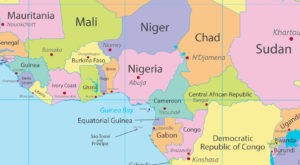
(Bigstockphoto)
They asked us to go back to Nigeria or join the Republic of Cameroon. Since we had been in Nigeria and Nigeria maltreated us and we walked out of the Nigerian House of Assembly at the time of the NCNC (The National Council of Nigeria and the Cameroons, a political party that served as platform for people of Nigeria and Cameroon colonized by Britain to champion their cause), we decided to join the francophones who we did not even know.
Culturally, they are different. We are English-speaking, with disciplined morals. They are French-speaking and different, but we teamed up with them. But the simple truth is that the merger was not approved by God. I’m bringing God unto it because the U.N. and the UK as big and learned as they are, made the union hurriedly without an agreement. So the two nations have been living without an agreement of unity since 1961.
U.N. and UK know that you cannot unite two people without a covenant. The word “covenant” in the Bible means agreement. There was no agreement. So the crisis that had erupted is really as a result of the maltreatment from the francophone side. They marginalized us and were trying to assimilate us and cause us to lose our identity. Our school system, government system, everything is English, and we were members of the commonwealth of nations.
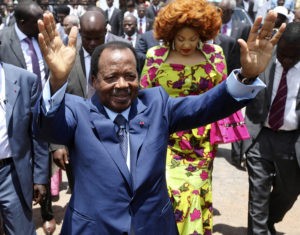
Cameroon President Paul Biya waves after casting his vote during the 2011 presidential elections in Yaounde, Cameroon. (AP Photo/Sunday Alamba)
Paul Biya (president of Cameroon) dissolved the union (between francophone and Anglophone areas) in 1984. There was a union flag of two stars identifying two groups — southern Cameroon and the French-speaking part of the country — but he woke up one morning in 1984, changed the name from United Republic to République du Cameroun, which is the former name, thus recognizing only the French-speaking area, and removed the star. It took 10 years for the people of southern Cameroon to say no, this can no longer work, there’s suppression and the marginalization is so clear.
The people resolved to go back to their name. They said, since you took back your name, we too will revert to our own name — Southern Cameroon. They (the government) started introducing us to the francophone system of education, the francophone law and others different from the British system. That’s when the war erupted. So, it’s a consequence of injustice and suppression and marginalization.
The fraud and wickedness on their part was too much. So we said, since you abrogated the union, we are also going back to our nation and we decided to say no and Biya now sent soldiers to (the southern part of the country). It’s five years now from when Biya ordered soldiers to go there. He thought that sending the military will quell the agitation of us rejecting the union. I was in the first group of agitators of the Southern Cameroons National Council, a pressure group seeking independence for the English speaking region.
In what capacity?
By just praying. I did not hold any official post. I was just an intercessor for the liberation of my people because I saw it in the Bible as us being like the Israelites in Egypt and we needed to divorce ourselves, to separate ourselves from people who are like the Egyptians, our task masters.
The conflict in Cameroon has created a lot of humanitarian crisis. Many Cameroonians are living as IDPs in Nigeria and other places. How would you describe the impact of the conflict on people and in what way are you personally affected by it?
As a result of the crisis, people have been displaced from their homes, homes have been burnt and many people have escaped to Nigeria, and you can see the huge number of refugees in Calabar, which shares boundary with southern Cameroon, and many others (are in other places). I’m one of them in America.
I was to be assassinated in 2004. As a servant of God, I pray and reveal what the Lord says. I preach righteousness, and assassins were sent to come and kill me but the God who answers prayer lifted me and I went into exile in Nigeria. It was from Nigeria that I had invitation to come to the United States to attend the Azusa Street revival in Los Angeles. Azusa is where the revival, Pentecostal movement was given birth in America.
I came here in 2006 but before I came, I had written a letter to George Bush (then U.S. president) while in Lagos saying that (Cameroonian government) wanted to kill a servant of God for preaching the truth about the (situation in Cameroon). I also had written a letter to Biya, which I copied the U.S., UK, France and U.N. with the heading: “Let my people go — says Jehovah Lord.” It was an eight-page letter. I also wrote a seven-page letter to the prime minister of Cameroon who comes from the English-speaking part.
“When assassins were sent after me, I fled to Nigeria.”
So when assassins were sent after me, I fled to Nigeria. When the assassins came, they didn’t see me. I was an evangelist without a church. If I had a church, they would have killed me in the church. In 2001, when I came back from Singapore where I went to be trained as a church leader, the Lord said, “Resign from pastoring.” So I resigned and became a freelance evangelist. I became a freelance evangelist with no address.
How did you get to know about the planned assassination?
In the Cameroonian government, we had southern Cameroonians. (One of them leaked the plot.) Before then, in a dream, I saw that I carried my bag from Victoria, going to Mamfe, which is my place of birth. I got to Mamfe but didn’t go to my father’s house. Instead, I went to a different village. I woke up from the dream thinking if I’m going to the village, why not stop in my father’s house? Why do I have to go to a different village where one of my cousins is a chief? I didn’t know that was my escape. A friend gave me transport money to go to Nigeria, and I escaped through the sea. It was in Nigeria that I got invitation to come to America, and three months after arriving in America, I was granted asylum.
There are people who argue that the conflict is still raging in Cameroon because there are people like you outside the country fanning the embers of war. What do you say to them?
There’s no country at war that has external citizens and the citizens will not assist. Look at all the wars … the war in Israel, was it not being funded by the Israelites in America who are very rich? Even the war in Eritrea and Somalia, they were collecting only $1 dollar (to fund it). So, the Ambazonia struggle is a just war and because it’s a just war … while I was in Lagos in 2004, the Lord revealed to me that the war is justified in that the union had no legality on earth and so it’s not established in heaven. The Bible says that what is agreed here on earth is established in heaven.
“There’s no country at war that has external citizens and the citizens will not assist.”
How has been your experience living in the U.S.?
Living in the U.S., I have not relented in my effort in the realm of the spirit to fight the battle because every war has two arenas — the arena of the spirit and the arena of the physical. God is fighting for us, and I am very convinced that our freedom has been released in the spiritual realm.
What regrets do you have about the conflict. Nobody, for instance knows when the trouble could end?
I know that it will soon end. It will end soon.
In victory for your people?
In victory for us. When the Lord says yes, nobody can change it.
How would you describe Christianity here in America compared to the situation in Africa?
Christianity in America does not need faith because they have everything. Christianity in America is like you just have to belong there but government has provided everything. But in Africa, either you practice faith or you don’t. So, standard of living has influence in Christianity. In Africa, you will pray and fast before you get what you want. So these are two different lifestyles that have influenced Christianity in both places.
Anthony Akaeze is a Nigerian-born freelance journalist who currently lives in Houston. He covers Africa for BNG.
Related articles:
Trump’s parting gift echoes his immigration policies toward Africa
In ‘demon sperm’ theology, the problem is not the demons| Analysis by Aaron Coyle-Carr
Angels from Africa: Reckoning with the New Apostolic Reformation | Analysis by Alan Bean

